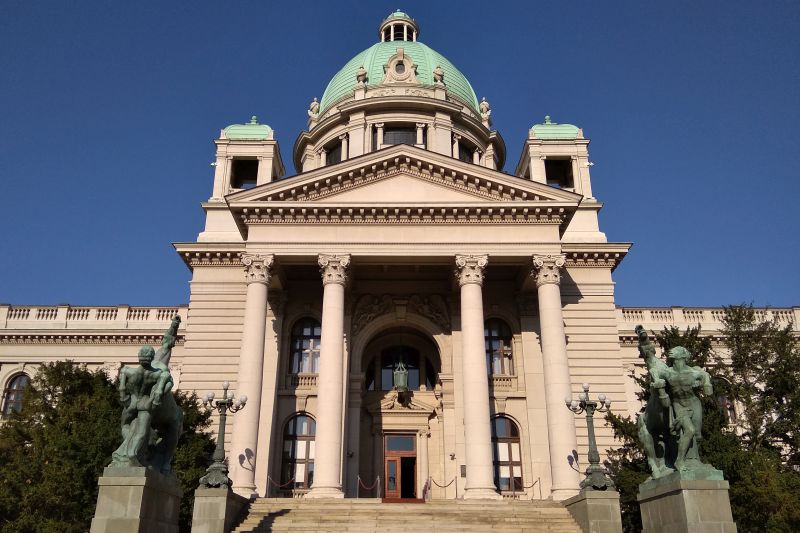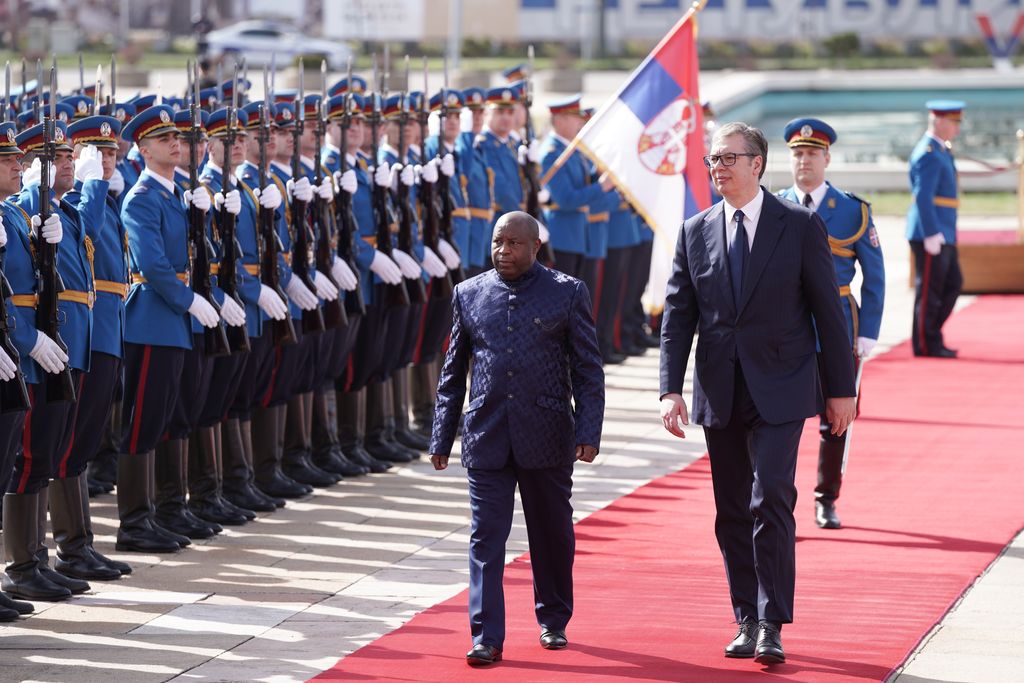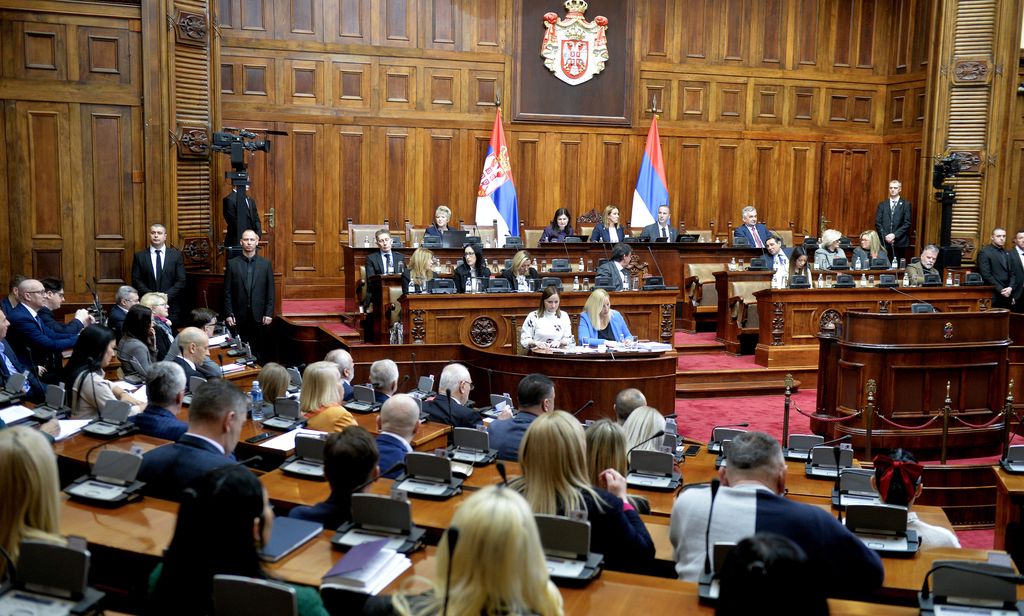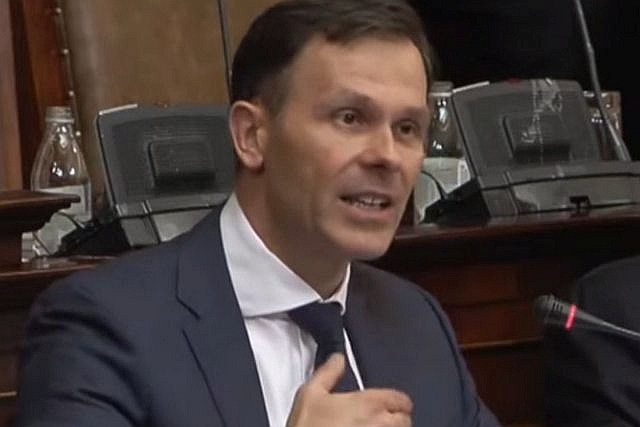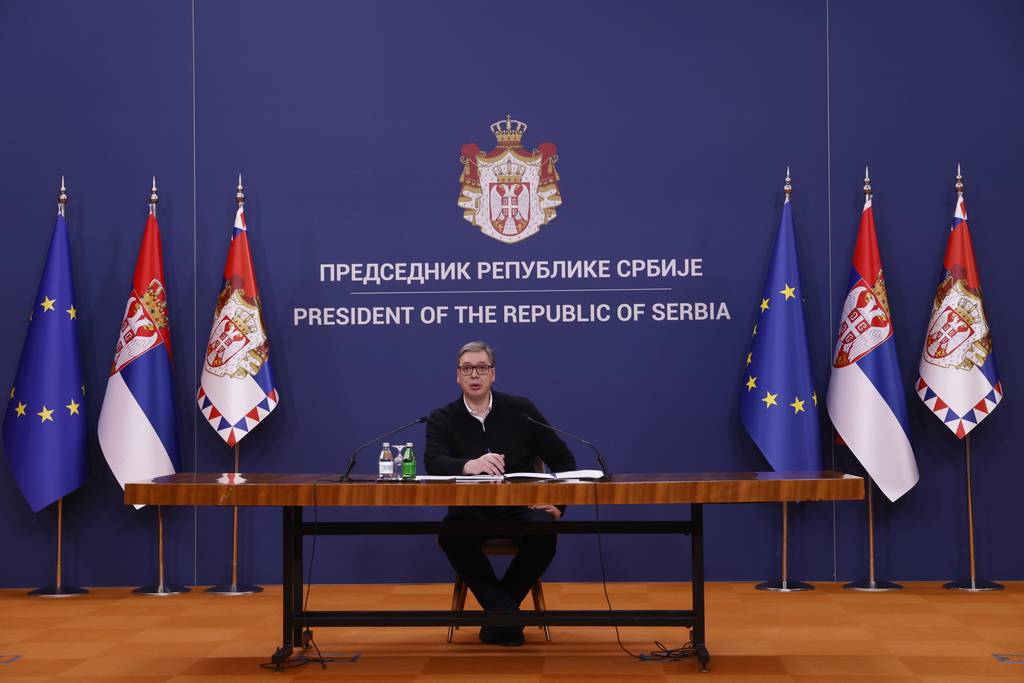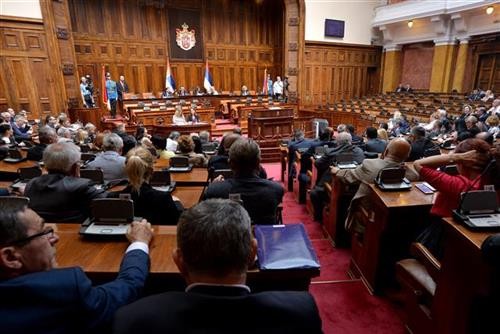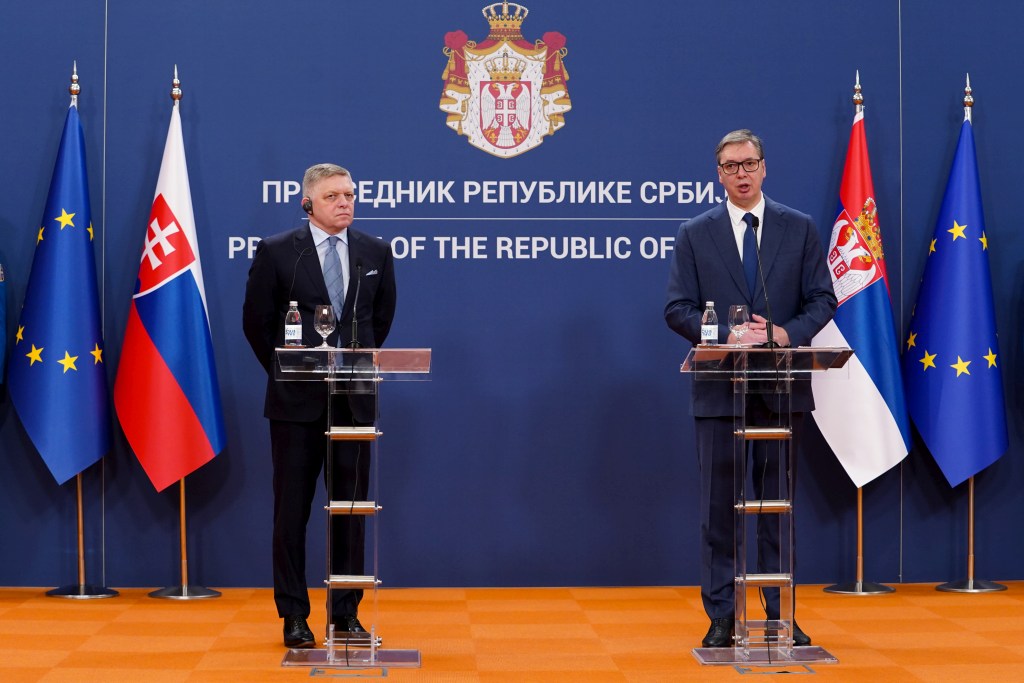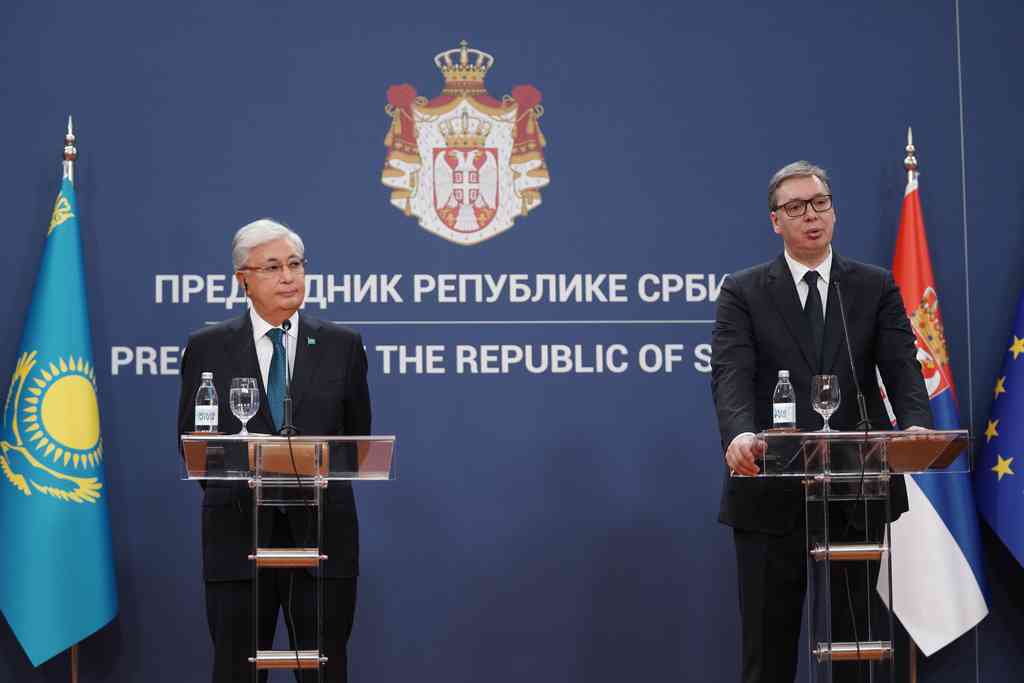In order to achieve these aims in the transport sector, the government will adopt an air traffic development strategy and policy, and as part of the normative activities related with air traffic, it will ratify the multilateral agreement on establishing European Common Aviation Area and the expansion of the single European airspace for Southeastern Europe, pass the law on the civil air travel directorate and the law on civil air travel.
When it comes to the housing sector, the government will continue with the Programme of Refugee Housing and Integration in seven towns and municipalities in Serbia, encourage the construction of social development and set up a cadastre of immovables and pass a law on social housing.
I find it important to emphasise that when it comes to the realisation of infrastructure projects, the government has already provided funds for financing, partly from its own income and partly from loans with the European Investment Bank, European Bank for Reconstruction and Development (EBRD), World Bank, funds from the European Agency for Reconstruction and EU funds.
The government will base its energy policy starting from the fact that nowadays energy is an important factor for attaining overall economic stability in the region and throughout Southeast Europe. Foreign investments are expected to be largest in the energy sector (around €3 billion). The government will strive to place the Serbian energy sector in the leading position of the region. It will use the advantages it has already constructed, such as Serbia’s electric energy system which is technically the best in the region, Serbia’s geostrategic position in the region which enables it to play the key role in electric energy transfer through its territory and the fact that through its electric energy sector it is in technical and regulatory aspects already linked with EU countries.
The gasification of Serbia will be the most attractive investment process, particularly once the Memorandum of Understanding on the construction of a gas-pipeline through Serbia is signed with Russia’s Gazprom. The government plan is to construct a 400 kilometre gas pipeline in the upcoming period, worth around €1 billion. Thus, further gasification will be enabled and will include about 400,000 households in Serbia, provide a safe supply to industry and enable further expansion of main and distribution gas networks.
Two permanent and long-term development and strategic aims in this are the following – Serbia’s active participation in planning and construction of strategic regional and Pan-European energy infrastructure for the transport of oil and gas from new supply sources, including urgent construction of the underground gas storage facility in Serbia and planning, construction and usage of new developmental, regional and strategic electric energy facilities on bordering rivers, and foreign investments with strategic partners in new power plants based on lignite from the territory of Kosovo-Metohija.
As for the oil economy, the government will round off the ongoing privatisation process of the Serbian Oil Industry, through which the current value of the company will be considerably increased. The Electric Power Company of Serbia will conclude the transformation process and the implementation of the Energy Sector Development Strategy envisages sizeable investments of domestic and foreign capital in new production capacities, such as the power plant Kolubara B, new hydroelectric power plants, revitalisation and modernisation of existing hydro and thermal electric capacities. The financial strengthening of the Serbian Electric Power Company will enable investments outside Serbia’s borders, as well.
In the utility energy sector, current heating sources will be modernised and new heating transfer systems built in the largest Serbian towns (Uzice, Cacak, Valjevo, Pancevo, Subotica, Novi Sad, Kragujevac, Kraljevo, Sombor, Pirot…).
The government will particularly focus on energy efficiency and energy saving programmes with the aim of reducing energy consumption by 10% every year.
Amendments to the Law on mining have enabled necessary safety measures when it comes to investing private capital in this economy sector. In the upcoming period, the government will ensure a large increase of private investments in geological research, excluding open coal pits, and will pass a strategy for developing the minerals and raw materials complex which will define guidelines for future sustainable development of mining in Serbia, and resolve normatively the possibility of mining concessions.
The agriculture and food industry sector is a vital element of Serbia’s economy. Approximately 45% of Serbia’s population is (directly or indirectly) involved in agriculture, and for more than 20% of people it is the sole means of income. Primary agricultural production and the accompanying processing industry participate with around 20% in the country’s total export and continually achieve surplus in foreign trade.
In managing its policy in this sector, the government will start from the fact that agriculture is of essential importance for Serbia’s development because it has not only economic, but also social and environmental significance. Appropriately, the government’s policy will include protection of domestic agricultural production by way of prevention of excessive import of basic agricultural products to Serbia. The government will not lead a protectionist policy but, in line with protection standards used by the EU as well and through implementation of the Serbian Agriculture Strategy, it will strengthen the country’s development and competitiveness.
The strategic aim of the government’s agrarian policy is the creation of conditions for efficient and sustainable agricultural development and improvement of living conditions of farmers and villagers. The government will clamp-down on monopoly behaviour in the agrarian market, carry out technical and technological modernisation of the production and processing sector, reform the education in agriculture, raise the quality of farmers’ social care, improve infrastructure in rural areas, provide faster implementation of results of domestic agricultural research and enable all farmers to earn a living and live better than before.
While implementing its agrarian policy the government will particularly focus on the following: equal-balanced regional agriculture development; enabling favourable loans for the development of agricultural production; enabling one-off funds for improving the production and environmental protection in rural areas; encouraging the placement of domestic products to new markets; increasing the competitiveness of domestic production; passing remaining laws in agriculture, harmonised with EU legal regulations; continuous increase of the agriculture budget and preservation of the maximum subsidy level in the agriculture sector.
As for the water management sector, the government will particularly concentrate on improving and reconstructing the efficient water protection system, and regarding forestry, it will conclude the restructuring process of the public company Srbijasume, compose a national action plan for forestry, increase wooded areas in Serbia, conclude the restitution process concerning state-owned forests and set up an information system for forestry resources. The government’s most important goals in the trade and services sector result from the National Economy Development Strategy 2006–2011 and include: the creation of attractive business atmosphere for raising the Serbian economy’s overall competitiveness and achieving dynamic economic growth; development based on the implementation of innovative products, new technologies, modernised service system, a permanent education and efficient infrastructure, with the ultimate goal of enabling an increase in living standards and reducing poverty.
The government will place special emphasis on the functioning of the goods and services market, ensuring that markets are fully supplied and the market and prices stable; improvement of trade, tourism and services sector; creating conditions for competitive economy and preventing monopoly behaviour; product quality control and consumer protection; managing state commodity reserves with the aim of ensuring the stability of markets and prices; establishing regulations and measures regarding trade and services policies and customs and their harmonisation with EU regulations, as well as development of trade and international tourist cooperation.
As part of the legislative activities in this sector, the government will pass adequate laws, many of which have already been drafted. It will also compose a national consumer protection programme before 2012.
The development of telecommunications and information society holds an important position in Serbia’s economic and overall development. Serbia’s greatest investment outside its territory was the purchase of Telekom Srpska, worth €646 million, and is also the largest investment made by a Serbian company. Further development and modernisation of landline and mobile phone networks, as well as of a broad-band internet network, is a strategic precondition of economic development and one of the government’s priorities.
In the telecommunications sector, the government will focus on the development of Telekom Srbija. In 2007, a CAPEX of RSD 31.6 billion, or €376 million, was planned for this company, with the aim of improving, modernising and digitalising the landline telecommunications system. The government will begin developing the Serbian academic network and implementing the Serbian electronic management project.
The government’s plan is to enable full mobile phone coverage throughout Serbian territory by end-2007.
In rural areas the government will continue works on the expansion and modernisation of the network, and where necessary it will enable telecommunications services through wireless technology.
The government will particularly give attention to the development of the Internet and the information society, which demands that an overall national strategy for information society development be defined and specified.
The right to work is one of the basic human rights guaranteed by the Serbian Constitution and a number of international conventions.
Striving towards better quality work places and higher salaries will be the government’s most significant goal in the upcoming period. The government will cooperate with unions, employers’ associations and investors on creating the most favourable social and economic climate with the aim of advancing the Serbian economy and improving the position of workers.
The government’s social policy will be in line with the already adopted Social Care Development Strategy. Starting from real indicators, according to which in the past three years total funds for social care increased by 125%, the government will work on the improvement of social status of citizens at personal, family and wider social levels.
With the foundation of the Serbian Social and Economic Council, presumptions were created for a more successful dialogue at state, local self-government and company levels.
As for social policy, the government will focus on employment, labour, pension and disability insurance, work inspection, social care, disabled persons and veterans’ protection.
The government’s top task in the nest four years will be to achieve a considerable increase in employment. With that in mind, the government will help workers to undergo the re-training process in transition centres and either maintain their position in current companies or find new employment. It will also be fully engaged in creating new jobs for the unemployed.
The government will start reforming the salary payment system in public services and dedicate itself to drafting a new law on salaries of employees in public services and thus make the salaries and promotion at workplace depend on the results of each individual’s work.
In order to further improve pension and disability insurance, the government will compose a development strategy, ensure that pensioners are economically secure by maintaining a suitable ration between pensions and average salary and conduct the process of “linking the years of service” for around 200,000 workers.
As for the work of inspection services, the government's goal is to suppress illegal work, reduce the instance of occupational injuries and pass a law on occupational safety insurance which will put an obligation on employers to pay insurance for their workers and pay them compensation for injuries caused at work.
The government will pay special attention to social protection of disabled persons by implementing the Strategy for the improvement of the position of disabled persons and adopting a law on professional rehabilitation and employment of disabled persons, which will create equal possibilities for their work and employment.
The government pledges to adopt a law on the protection of war invalids and to solve their housing problems.
The government will continue the reform of public administration and local self-government according to the Strategy of public administration reform, with the aim of getting a public administration capable of providing high quality services to citizens and becoming their true service. The government will pay special emphasis to consistent completion of the process of depolitisation and profesionalisation of civil servants and overall modernisation through introduction of new information technologies to the work of public administration. The government will pass missing legal acts and take other appropriate measures needed for the accomplishment of these goals.
The proper ministry will work out a unique electoral poll and provide mechanisms for the implementation and control of its regular updating. The ministry will also make it easier for Serbian citizens living abroad to exercise their voting rights by making a more comprehensive list of voters living abroad.
In the field of local self-government, the government's priority will be to speed up the process of establishment of the local self-government in line with the provisions of the new constitution and to boost its capacities through the process of decentralisation of authority which is fully supported by the new Constitution. In the shortest time possible, the government will begin the preparation of a set of laws on local self-government envisaged by the Law on implementation of the Constitution, in order to secure normative preconditions for calling and holding elections for local authorities within the deadline set by the Constitution.
In order to create necessary preconditions for a successful process of decentralisation of power and accelerated development of local self-government, one of the government's priorities will be normative regulation of the issue of management of local property by organs of local self-government and the reform and control of privatisation of local utility companies. In order to enable local self-governments to have better and faster access to funds necessary for the development of their infrastructural objects, special attention will be paid to the strengthening of the role of the Agency for development of local self-government, which is part of the government as a special organisation. This Agency should enable easier access to funds and linking of local self-governments with interested investors, and assistance to local self-governments in the realisation of infrastructural projects.
The government will implement education policy starting from three fundamental assumptions: that the education system is of strategic importance for the overall development of Serbia, that Serbia has a long and good educational tradition and that on the basis of that it is necessary to go on with a well-conceived and complete reform of the education system.
The government’s aim is to functionally harmonise all aspects of educational development so that the educational system could modernise in line with contemporary requests of societal development.
Bearing in mind that education system reform is the foundation of the overall progress of Serbian society, the government will pay most attention to:
- modernisation of syllabi and teaching process,
- technical and administration training, modernisation of equipment and conditions of work in educational institutions,
- rationalisation of the Serbian educational system,
- improving the standard of educational workers,
- securing financial means for modernisation of the educational system.
The government will prepare an educational strategy in Serbia on the basis of which the Serbian educational system will harmonise with world standards. The government will also ensure care for our state and national interests and interests of the citizens, using our own comparative advantages and preserving the specific features of our educational and cultural tradition.
Decentralisation of education, that is, transferring authorities and capacities on the local level is also one of government’s tasks.
The government will see to drafting important laws, such as law on pre-school education and law amending the Law on educational system.
Starting from the multivolume importance and role of sports in our society, the government will continue to work on improvement of appropriate conditions for a successful development and promotion of both top-class and recreational sports. In this field, the first task for the government will be to pass a national sports development strategy in Serbia and a law on sports.
For the successful development of sports, it is necessary to provide stable funding, which refers to building sports facilities, providing good quality sports equipment, preparation of first-class athletes, their participation in competitions and providing a durable social status of athletes.
During the upcoming period, the government will allocate considerable funds especially for sports facilities of national importance for construction and reconstruction of large sports centres, pools, sports halls and gymnasiums, as well as open sports tracks and children’s playgrounds of local interest. Special attention will be dedicated to the development of women’s sports regardless of whether the sport activity in question is professional or recreational.
The government will create a national youth strategy, adopt action plans for its realisation and standardise protection, development and promotion of the youth. Hence the government will direct its activities towards: stimulation of youth organisations and associations; participation of the youth in social processes; exercise and protection of interests of the youth; initiating, tracking and harmonising of professional and administrative affairs of public administration bodies in planning, stimulating and implementing youth social care, particularly in the fields of health, entrepreneurship and employment, education, culture and arts, science, social position and security of the youth; preventing youth abuse; implementing their rights; stimulating cooperation with international youth organisations and associations as well as the care on development of young talents.
For the purpose of realisation of the youth-related programmes, the government will form special offices to work with youth and agencies for care on talents.
The government’s health policy will start from the fact the citizen is the main subject of the heath system. The government’s aim is to establish the system of sustainable financing and to provide continuous promotion of quality and efficiency of health care for all Serbian citizens.
The focus point of health policy will be specially directed to health care of susceptible groups of population, strengthening preventive health care and implementation of the programme of general interest, development of the programme for diseases of greater social and economic importance as well as constant continuation of quality of work in health institutions.
With a view to creating appropriate financial assumptions for executing health policy, the government will pay most attention to promotion of the hospital system. For that purpose, reconstruction of hospital infrastructure and equipping health institutions with state-of-the-art diagnostic and other equipment have stated and will go on. In order to equally and fairly execute health care in the whole territory of the Republic of Serbia, the government will reconstruct and equip the four clinical centres in the Republic in the upcoming period.
The government’s tasks in health care policy are set in strategic documents that the government already passed and prepared in the previous three years. Medium-term health policy priority objectives in the 2005-2010 period are: improving the health care system for susceptible groups of population, especially children and youth; implementation of public health strategy; improving oncology protection, prevention and control of contagious and addiction diseases; improving the quality of work of health institutions and health workers, adopting special sectoral laws.
In implementing its environmental policy, the government starts from the position that a healthy environment is precondition for good health and the future of our population as well as economic progress and improving the living standards of society. The government will pass an all-encompassing programme that will cover both environment-related issues and the fields of water management and forestry.
The government will dedicate special attention to inclusion of environmental policy in other sectoral policies, creating and implementing action plans arising from the national environmental programme, which will be followed by appropriate regulations.
Special activities in this field will be directed to solving the problem of waste management and construction of regional waste dumps in cooperation with local self-government units.
As for finding a solution to the problem of biggest industrial polluters, the government will take measures to prepare a full record of polluters for whole Serbia and neutralise the biggest industrial environmental polluters.
When speaking on building the monitoring system, the government will provide continuous monitoring of air quality in Serbia in compliance with regulations of the European Environment Agency and constant monitoring of input and output waterways as well as radioactivity on the borders of the Republic of Serbia.
As for the environmental development of international cooperation and European integration, the government will conclude an environmental cooperation agreement with all neighbouring countries and countries that are Serbia’s strategic partners, and will continue cooperation with regional organisations that are in charge of environmental cooperation and will continue with ratification of international conventions and their realisation at national level.
The government’s programme for science and technology development will include a principle-based application of the Law on scientific and research activities and the Law on innovation activities, together with the Law on higher education, which make the foundation for establishing the so-called triangle of knowledge comprising education, research and innovations. Application of mentioned laws should promote top world standards in quality of research, but also promote the importance of science and technological development as the main driving force of the economic development.
In this field, Serbia is joining EU’s efforts to reach the level of setting aside 1% of GDP for scientific research by 2010. The government will practice a stimulating tax policy in order to provide additional 2% of GDP through cooperation of scientific-research and economic sectors.
The National Council for Science and Technology is expected to adopt soon the strategy of scientific and technological development that will define priority fields of science and technology in which there are realistic research potentials in Serbia.
At the same time, the policy of stimulating transfer of knowledge and technology will continue as well as stimulating application of scientific results and development of innovation systems. The policy of development of scientific and research staff, equipping the scientific and research organisations for practicing research activity, purchase of professional literature and electronic databases, publication of scientific publications, organising scientific symposiums and support to scientific and professional associations and helping special organisations of national importance, such as Serbian Academy of Arts and Sciences (SANU) and Matica Srpska, will be further developed. Special attention will be given to project of infrastructure building and revitalisation of national importance that are taking place in Serbian largest scientific institute of Vinca.
The government will support participation of Serbian institutions in programmes of international cooperation, and most importantly, Serbia’s joining the Seventh Framework Programme (FP7) for research and development. In this programme, Serbia will participate under the same conditions alongside other EU member countries and equally compete for funds from EU’s budget. The support by the European Commission to Serbia as regards to associated membership in the FP7 should be followed by strong internal infrastructure support and stimuli by the state in research sector in order to secure EU funds in this area.
In the field of culture, the government will start from the position that artcraft is free, spared from the political influence.
The starting point of Serbian cultural policy is a long-term strategic plan of cultural development of the whole country, which is why the government will create a national strategy on Serbian culture and a law on culture. On the basis of the national strategy, priorities will be set in the development of culture and preservation of cultural heritage, for which the government will provide sources of funding.
Constant attention will be given to cultural institutions of utmost national importance, restoration and preservation of cultural heritage, especially in Kosovo-Metohija.
The government will provide financial support to domestic artists and performers so that they can achieve the highest level of artistic performance and be able to adequately represent the country abroad. The government will regulate in a special law the conditions for artists to get the status of independent artists and right to payment of health and pension insurance from the state budget.
Today in Serbia religion has the position as in other developed and modern democratic societies and is accepted as important factor of social development, connected and fruitfully interrelated with education, culture and science, as well as with social activism, civilisation longings and society’s public morality. The government will continue to support the social role to churches and religious communities; improvement of tolerance, dialogue and cooperation between churches and religious communities; cooperation of the state with every individual church and religious community in order to carry out common interest and general benefit, first of all, in order to harmonise relations within society, cherishing solidarity and building a reliable value system on which the new unity of European nations and states is grounded on; improvement of position of religious education in society; equal treatment of religious culture in public with other forms of culture; improvement of material position of churches and religious communities and durable preservation of shrines, clergy and monks in Kosovo-Metohija and their integration in social and cultural system of Serbia.
Preserving existing and establishing even closer ties with Serbian citizens living abroad and with those of Serbian origin but without citizenship are most important aspects of policy toward the Diaspora. The government will help them use their rights but also help them contribute to the country’s development in every aspect through popularisation of the Serbian culture and identity and promotion of the country’s image worldwide.
The government will offer assistance related to the solving of fundamental life’s issues that the Diaspora is facing: gaining citizenship, military service, denationalisation, voting in elections, tuition in the Serbian language and preservation of cultural identity abroad.
Especially strengthened will be cooperation with part of the Diaspora that is made up of younger generation, successful professionals in their fields of expertise, scientists, experts and academic workers. The aim is their connection and engagement on developing economic, scientific, cultural and integration potentials of their county of origin.
Concrete activities of the government in relation to the Diaspora will be divided into two parts. First, toward persons who are born or live outside Serbia for a longer time and intend to stay there, including members of the second and third generations of Serb expatriates. The government will put its stress on preservation of national and cultural identity and strengthening ties. Second, the focus will be on persons who live outside Serbia, either studying or working, and there is a probability or intention that they might come back to Serbia and invest in it. In that segment, programmes and activities of the government will be directed to creating more favourable conditions that provide return, employment and exchange of ideas and knowledge.
Ladies and Gentlemen Deputies, I presented you the summary of the programme of the future government of Serbia. Allow me now to suggest the future makeup of the Serbian government. I suggest Bozidar Djelic as Deputy Prime Minister in charge of European Integration, Vuk Jeremic as Minister of Foreign Affairs, Dragan Jocic as Minister of Interior, Dragan Sutanovac as Minister of Defence, Mirko Cvetkovic as Minister of Finance, Dusan Petrovic as Minister of Justice, Milan Markovic as Minister of Public Administration and Local Self-Government, Slobodan Milosavljevic as Minister of Agriculture, Forestry and Water Management, Mladjan Dinkic as Minister of Economy and Regional Development, Aleksandar Popovic as Minister of Energy and Mining, Velimir Ilic as Minister of Infrastructure, Aleksandra Smiljanic as Minister of Telecommunications and Information Society, Predrag Bubalo as Minister of Trade and Services, Rasim Ljajic as Minister of Labour and Social Policy, Ana Pesikan as Minister of Science, Sasa Dragin as Minister of Environmental Protection, Zoran Loncar as Minister of Education, Snezana Markovic-Samardzic as Minister of Youth and Sports, Vojislav Brajovic Minister of Culture, Tomica Milosavljevic as Minister of Health, Radomir Naumov as Minister of Religion, Milica Cubrilo as Diaspora Minister, Dragan Djilas as Minister without Portfolio in charge of coordinating the National Investment Plan and Slobodan Samardzic as Minister for Kosovo-Metohija.












